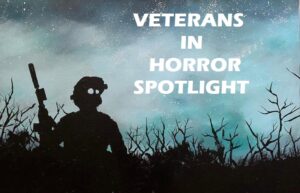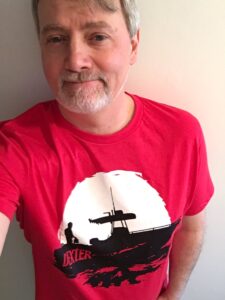Veterans in Horror: Interview with Michael Arnzen

 Michael Arnzen holds four Bram Stoker Awards and an International Horror Guild Award for his disturbing (and often funny) fiction, poetry and literary experiments. His books include Grave Markings, Play Dead, Proverbs for Monsters and 100 Jolts. He has been teaching as a Professor of English in the MFA program in Writing Popular Fiction at Seton Hill University since 1999. See what he’s up to now at gorelets.com
Michael Arnzen holds four Bram Stoker Awards and an International Horror Guild Award for his disturbing (and often funny) fiction, poetry and literary experiments. His books include Grave Markings, Play Dead, Proverbs for Monsters and 100 Jolts. He has been teaching as a Professor of English in the MFA program in Writing Popular Fiction at Seton Hill University since 1999. See what he’s up to now at gorelets.com
Tell us a bit about your military service. Years? Branch? Specialty?
I joined the US Army shortly after high school, because I was afraid I wouldn’t be able to afford college and the special two-year enlistment with GI Bill bonus they offered was simply impossible to pass up. I also think my juvenile mind believed I’d be safer in the military than the civilian world if a nuclear apocalypse were to occur, which I felt was a real possibility at the time. Anyway, I got something like six steak dinners out of the recruiter before I agreed to the contract. Hardest time of my life; one of the best decisions I ever made. I was sent to Germany, and spent two years in the Signal Corps, manning radio equipment. My MOS was “Multichannel Communications Equipment Operator” which is a fancy way of saying a man who erects radio towers then spends all day cooped up in the back of a nondescript van, being a knob-twirler. Did a few years afterward in the Reserves when I got back, playing “Radio Dog” at Ft. Collins just for a little extra spending loot, because guess what? I found myself in college as an English major and needed the money for beer and pizza and…writing supplies. It all worked out perfect.
What role, if any, did reading and writing play during your military service?
Stationed overseas, spending most of my time holed up alone in a radio van in the woods… the loneliness might have been crippling if not for the occasional visit to the PX where I could shop for books for cheap and portable entertainment. I was inevitably drawn to humor and horror, and found myself reading every Stephen King and Clive Barker title they had on the shelf. I also loved talking about horror movies with my Army buddies… it was a common touchstone between us – as was music – and it led to some good friendships. One of my friends from my early years in the service (Bill Bush) reconnected with me many years later, and it turned out he was collecting horror novels and stumbled upon me all over again! Now we’re close friends and he’s like the only person I even talk to from those days – funny how horror brought us back together. I guess it’s a small world.
What inspired you to start writing?
I was always into storytelling, but the writer bug bit me when I was in the Army, actually. I think I was into my eighth Stephen King novel (it definitely was Firestarter, I recall) in the back of that radio van, when something larger came into my view: there are patterns to these stories I love that I can’t ignore. Easily replicable patterns. In King it was mostly small town teens “coming of age” by learning how to control their new-found curses and owning up to their power. There was always some outsider who would come “running to the rescue” only to be slashed or bit or decapitated right when they arrived, leaving the main character on their own to solve their troubles in a final act of ownership and transformation. There was always a twist ending that tapped into a sublime higher power just a little out of reach of the characters and me, the reader.
Now I wasn’t just reading King, and some of these patterns are true of all stories, but I thought I had it all figured out and it made me mad when I started predicting what would happen in the next chapter of Firestarter. Seeing the patterns ruined the stories and they were also kind of PG-13 to me, and I wanted the horror to go darker and deeper than what the mainstream presses were putting out. I wanted it to be as weird as the rated-R horror movies my dad snuck me into with him when I was probably too young, too impressionable. Anyway, I got mad, put down the book and thought: I can do better than this!
So I tried. But I failed. I wrote a dumb 15-page handwritten story about an insane man obsessed with the sounds of buzzing flies in his apartment, who eventually leaps out the window to chase one and hits the pavement — where the fly gently descends and lands on his dead open eye. That sounds good but it was not. Hahah. I learned how difficult it is to pull off a good horror story, let alone a novel, without sounding silly, juvenile and derivative. But when I read it out loud to my bored Army buddies, they laughed, and suddenly it clicked: I could get a reaction. They weren’t nearly as critical as I was. So I kept trying, kept writing, kept refining things on my own terms while making a self-study of how-to books. Later, after the Army, I had money in my pocket for college, took classes and avoided English until it felt inevitable that studying literature, taking writing classes, and joining the world of books was my destiny. I only knew that I didn’t want to teach high school. Joke was on me, I ended up teaching college many years later. But I also ended up selling my first novel before I graduated, so it really all came together then.
What was it about the horror genre that drew you to it?
The excessiveness of it all, I guess. Going places society tells you not to go. The wanton exploration of the taboo. It’s like horror writers hold your eyes open and both make you and allow you look at things you secretly want to look at or thinking about. And when it isn’t indulging those dirty desires, it’s just fucking hilariously over-the-top. I love the exuberant freedom of horror, and the flexibility it has to address everything and anything. Because everything and anything can be scary and weird, if spun the right way.
What role, if any, does your military experience play in your writing?
Aside from sharing stories with my Army buddies and catching the bug of entertaining people, I’d say I learned about CHARACTER. Everyone is a character in the military. Why? Because the entire environment forces everyone to look, act, and talk the same way. So your personality comes out between the cracks, in sharp relief. And these were the only thing I cared about in relationship with my peers: who they really were, or who they really wanted to be, and not just who the uniform tried to turn into.
Otherwise, I have written a few military-set short stories and poems, but not too many. A story called “The Spirit of the Bayonet” is probably my best attempt at that, and it literally drew from the weirdness our drill sergeants used to scream at us and some people I met in Basic Training.
What is your favorite depiction of military service in all of literature? Why?
Read In the Lake of the Woods by Tim O’Brien. It’s a literary novel, told as an “unsolved mystery” and is a horror story about PTSD and politics, in many ways. Check it out! In fact, almost any Tim O’Brien novel will blow your mind even while delving into the darkness of Vietnam. I also am a huge fan of Ambrose Bierce’s short stories and war was a constant theme of his work. Sure, most people know “An Occurrence at Owl Creek Bridge” but my favorite is “Chickamauga” – a must read, for sure.
How do you feel military veterans and the broader military experience has thus far been represented in the horror genre?
The horrors of war — the insanity of the battlefield and the evil that men do when put into a cauldron of extreme survival against their fellow man — has been a common trope throughout the history of literature, and horror writers have done their share of representing warfare too, from medieval battle to the zombie apocalypse. So this is a tough one to pin down. If there was one film to see on the subject, I’d recommend Joe Dante’s contribution to Masters of Horror, called Homecoming. The allegory for the exploitation of vets and the poetic justice involved in that story is over the top. It’s like, what if Rambo were a zombie or something like that. Scratch that: Just watch it.
Who are some civilian characters in horror that you think would have made for great soldiers?
Well, call me a goofball, but Ash from Evil Dead comes immediately to mind. Even though he fought the “Army” of Darkness. His talent for surviving against all odds, his ability to MacGyver his weapons and environment to work in his favor, and his quick-witted defiance of the insane odds against him posed by the enemy make him my pick for best civilian soldier of horror ever.
Who are some military veteran horror authors you recommend our audience check out?
Aside from the canonical writers like Ambrose Bierce, it’s hard to say. Brian Keene and Weston Ochse come immediately to mind; Kristi Kulski is an emerging writer to watch out for, too.
I look forward to following this article series to learn about more of them, because I know there are a lot of veterans in our midst, but most are probably not wearing it on their sleeve. I know I don’t, and it’ll probably come as a surprise to some reading this that I’m a veteran at all. Hmm.
What’s something about veterans most people don’t know?
Maybe too often vets are construed to be people broken down by the system, whether wounded in war, suffering PTSD, or just old and bitter and angry at everyone they once defended. But all the vets I know — even those who ARE suffering from their experiences — seem to be service-oriented, charitable people, who help others on instinct, and maybe enjoy being leaders or part of a team in the name of progress and problem-solving. They’re like humble everyday heroes, pragmatists sometimes almost addicted to teamwork and group accomplishments. We have them in our midst in the Horror Writers Association and working to serve in functions like Scares that Care and so forth. I’d like to see this spirit reflected in the representation of vets in fiction more often.




Thanks so much for posting this and for supporting our veterans (and those from all countries!).